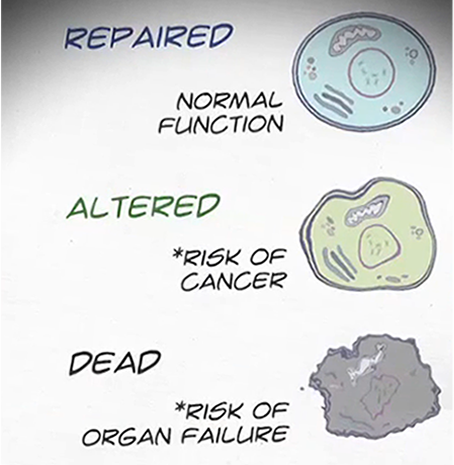Health Effects of Radiation: Health Effects Depend on the Dose
Radiation exposure is one of the best-understood health hazards. We have been studying the effects of radiation for over 100 years, so we know quite a bit about how radiation interacts with living tissue.
As with other toxins, “the dose makes the poison.”
It is the radiation dose, or the amount of radiation, that is the critical issue in determining health consequences. It is helpful to put radiation dose in perspective.
We receive low doses of radiation from our natural environment.
However, we know that radiation at high doses can be lethal. We know that radiation can cause cancer, and we also know radiation can be harmful to the fetus at various stages of pregnancy. And, although we haven’t seen it in humans, radiation can cause hereditary effects in lab animals.
How fast the dose is received
This is known as the dose rate. If a person receives a dose over an extended period of time, the impact on health won’t be as severe as if the same dose were received all at once.
Where the dose is received
If the dose is received by only a portion of the body, the impact on health won’t be as severe as if the dose were delivered to the entire body.
How sensitive the body is to radiation
Individual sensitivity to radiation is also a factor. A developing fetus is the most vulnerable to the effects of radiation. Infants, children, the elderly, pregnant women, and people with compromised immune systems are more vulnerable to health effects than healthy adults.
For more information on radiation and pregnancy, click here
The risk from radiation is higher for younger people mainly because:
- Younger people have more cells that are dividing rapidly and tissues that are growing
- Younger people have a longer lifespan ahead of them, giving cancers more time to develop
Also, some people within the same age group may have different sensitivity to radiation.
Like with many other contaminants or toxins, our genetic material, or DNA, is the primary target.
Radiation can interact with DNA directly and cause damage by breaking bonds in the DNA or indirectly by breaking water molecules surrounding the DNA. When these water molecules are broken, they produce free radicals–unstable oxygen molecules that can damage cells and organs.
Once a cell is damaged, three things can happen.

1. The cell repairs itself. The cell would then go back to normal.
2. The cell damage is not repaired or is incorrectly repaired, so the cell is changed. This change may eventually lead to cancer.
3. There is too much damage to the cell, and the cell dies. Cell death is not always a bad option.
- If a few radiation-damaged cells die, your body will recover and you do not have the risk of those cells potentially turning into cancer.
- However, widespread cell death, such as that caused by high radiation doses, can lead to organ failure and, ultimately, death.
To learn more about Radiation Emergencies and Your Health, Click Here
Dose rate — The radiation dose delivered per unit of time.
Radiation — Energy moving in the form of particles or waves. Familiar radiations are heat, light, radio waves, and microwaves. Ionizing radiation is a very high-energy form of electromagnetic radiation.
Radiation dose — Radiation absorbed by person’s body. Several different terms describe radiation dose. For more information, see “Primer on Radiation Measurement”.